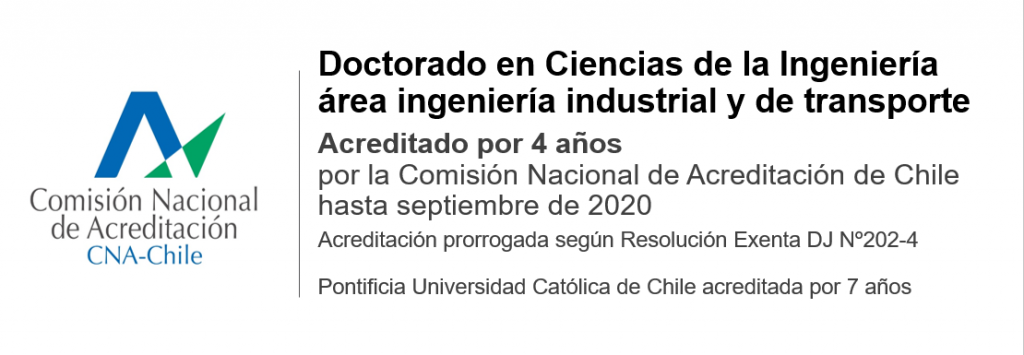

The complexity of current technological challenges requires experts able to create, adapt, and integrate solutions globally. The Doctor of Engineering Sciences program contributes to this perspective, allowing students to become involved in new research and development for the industry, regulatory agencies, and academia. Furthermore, this doctorate program is a platform for launching specialized consultancies, creating innovative companies, and acting as integral agents for technological change in businesses.
Our students can conduct research stays at world-class international institutions, as financed by the School or the University. Likewise, doctoral students must present their research results at international congresses and publish articles in recognized academic journals. Students can also opt to earn a dual degree through established agreements with prestigious international universities.
The Doctor of Engineering Sciences Program trains world-class specialists who have solid scientific-technological knowledge and who are able to independently conduct original, cutting-edge research.
To be granted the degree of Doctor of Engineering Sciences, candidates must demonstrate mastery in their area of study and the ability to independently conduct research, making novel contributions to existing knowledge.
During the doctorate program, students will acquire the skills needed to creatively and efficiently face scientific and technological challenges. This necessarily requires complementing solid theoretical and conceptual foundations with the application of relevant analytical methodologies and techniques in one of the research lines included within a specialized area of the doctorate program.
Graduates from the Doctor of Engineering Sciences Program in this area specialize in the design, construction, and management of the infrastructure needed by our society while adapting to economic and social restraints and aiming for environmental sustainability. This program emphasizes being able to create new knowledge and address multidisciplinary challenges that incorporate themes related to environmental and geoscience engineering. Students should be able to concretely contribute to solving complex civil engineering problems of relevance nationally and worldwide, particularly when innovation is a relevant component.
Area head: Rodrigo Cienfuegos Carrasco
The aim of this research line is to generate fundamental knowledge and technological developments related to infrastructure sustainability and resilience during the distinct lifecycle stages of building and civil engineering projects, such as related to design, construction, operation, and provisions. Infrastructure that comprehensively contributes to community development, minimizes environmental impacts, is economically beneficial, and is resilient to extreme situations (e.g., climate change and natural disasters) is made possible by applying complex engineering processes. Achieving these points requires knowledge on subjects such as the evaluation and mitigation of risks from natural disasters, optimized and sustainable use of water resources, and the development of innovative technologies in buildings that minimize energy consumption and consequent environmental impacts. This research line includes topics such as Structural Engineering, Construction Management, Hydraulic Engineering, Geotechnical Engineering, Seismic Engineering, and Materials Engineering.
The aim of this research line is to generate fundamental knowledge and technological developments on natural earth system processes, as well as the interactions thereof and impacts to continued development and the sustainability of society. These complex natural processes, which occur on varying spatial and temporal scales, require a multi-systemic and integrated viewpoint of the geosciences, the environment, and civil engineering. The goal of this integration is to understand and control the impacts of civil engineering on natural systems, ultimately using natural resources and energy in the most efficient and environmentally responsible ways possible. This widened perspective will also allow understanding the impacts of physical, chemical, biological, and geological processes on mankind’s quality-of-life and on engineered infrastructure and services. This research line includes topics such as Rivers and Coasts, Fluid Dynamics, Water Resources, Environmental Engineering, and Geosciences.
See program details here.
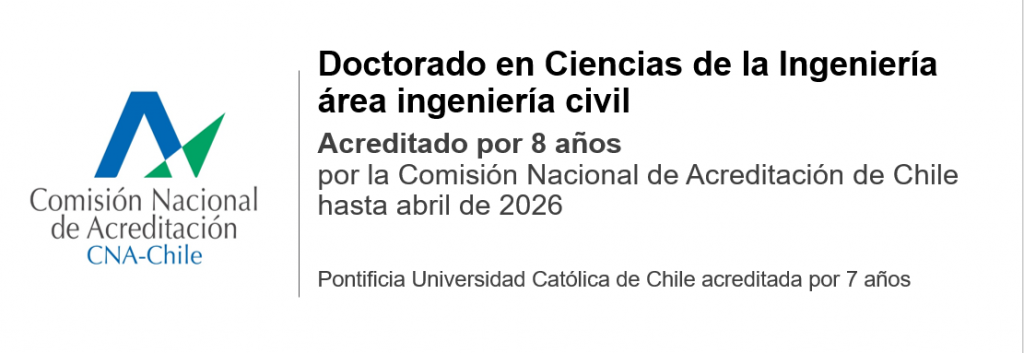
The objective of our Doctorate in Engineering Sciences, belonging to the Chemical and Bioprocess Engineering Department, is to form researchers with a robust scientific-technological orientation that can perform original and independent research in the boundaries of knowledge. Therefore, they can contribute to the scientific-technological development of biotechnology, food engineering, and chemical and environmental processes.
During their research, the students must contribute to knowledge with creativity, leadership, and originality as part of their training, thus preparing their future performance as researchers. The primary basis for obtaining the doctoral degree is the students’ capacity to dominate their research subject and perform independent research.
For obtaining the Doctor in Engineering Sciences degree, the students must demonstrate domain over their study areas and their capacity to perform independent research, contributing with original knowledge to the Chemical and Bioprocesses Engineering subjects.
During their doctoral training, the students acquire skills to confront scientific and technological problems creatively and efficiently. Students must then show strong theoretical and conceptual bases, applying methodologies or analysis techniques in one or more of the program’s three research lines.
The graduates from our program will be able to:
Therefore, the graduates from this program will be able to work in any of the areas related with their doctorate, for instance, as academics in a university, as researchers for technological development in the industry, R&D centers, and/or as consultants in engineering, innovation, and entrepreneurship companies.
Area head: Néstor Escalona Burgos
The activities performed at DIQB are oriented to research applied to three main topics: biotechnology, food engineering, and dynamics and modeling of chemical and environmental processes.
Biotechnology
This line consists of two main areas. The first area is related to metabolic engineering, including the optimization of metabolic networks, genetic engineering, biosynthesis of high-value compounds, and bioseparations. The second line is cellular biotechnology, including genomics, microbiome, tissue engineering, and synthetic biology.
Food Engineering
This line consists of the study of food from the engineering and technology perspective. It covers opportunities and innovation developments in the rational design of food and its microstructure, effects on the chemical and microbiological innocuity, the use of autochthonous raw materials, and the analysis and modeling of emerging technologies.
Dynamics and Modeling of Chemical and Environmental Processes
This line focuses its study on industrial chemical processes. Mainly, heterogeneous catalysis, physicochemical characterization of materials, thermodynamic equilibrium, modeling and characterization of new solvents for separation processes, kinetics for bioremediation, biodegradability analysis and transport phenomena related to atmospheric pollution, advanced techniques for the extraction of nutraceuticals, and the computational modeling of process control.
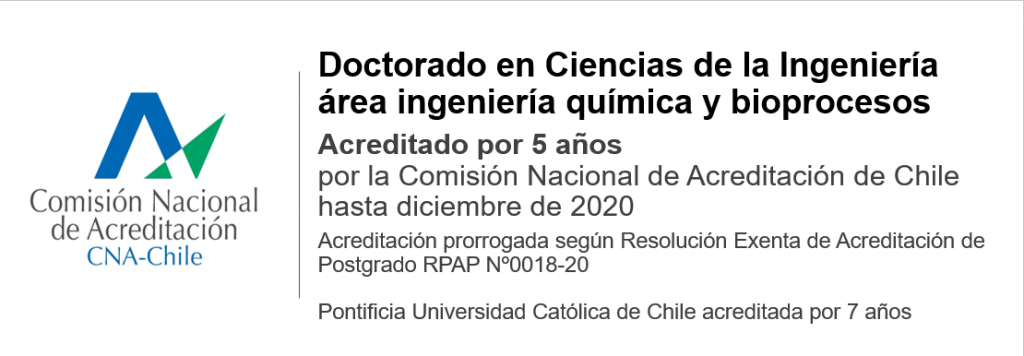
Graduates from the Doctor of Engineering Sciences Program in this area will be able to conduct original, independent research in one of the research lines led by faculty within the Electrical Engineering Program.
Area head: Felipe Núñez Retamal
See program details here.
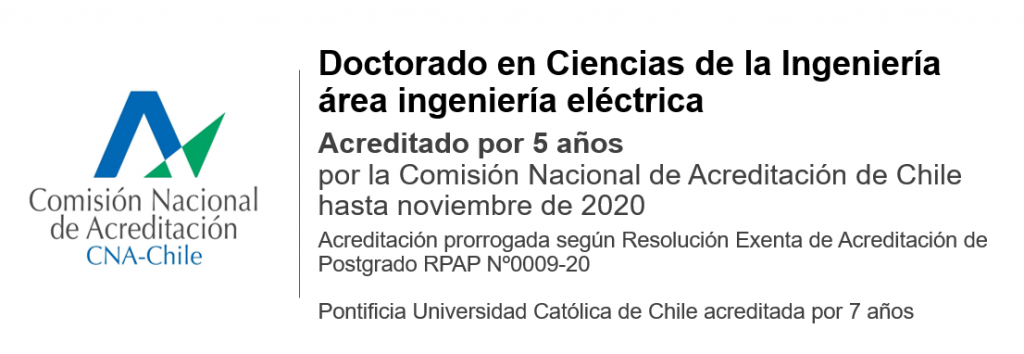
Graduates from the Doctor of Engineering Sciences Program in this area will receive state-of-the-art knowledge in the area of Computer Science through a systematic course program and by conducting doctoral thesis research.
Doctoral research should contribute new knowledge in the area of Computer Science. This goal will ensure that graduates have the skills needed for any continued academic work and to carry out research with elements of creativity, leadership, and originality. The final requirement for receiving a doctorate in this area of specialization is to master a wide area of study and evidence the ability to conduct independent research in one of the defined research lines.
Area head: Juan Reutter de la Mazza
The activities carried out in the Department of Computer Science are oriented towards research and application in two main topics: A. Human-oriented computing and systems and B. Computer science.
Human-Oriented Computing and Systems
This line of research focuses on the processes and tools that exist for and due to the interaction between humans and people. This research focuses on the analysis of the interaction of processes between humans and computers, as well as the development of new technologies to improve these processes. In this line, different points of view converge from where we look at technology and its interaction with people, which includes software development and specification mechanisms, the study of the impact that interfaces and technologies have on human processes, and the data they generate on human-computer processes.
Part of the research topics addressed in this area include: modern development processes and creation of methods and tools to build high-quality software, the role of information technologies in educational processes, processes in health and medical education, among others. The computer science department has three research laboratories dedicated to more specific problems in this area: The Software Engineering and Intelligent Systems Laboratory (SEISlab), the Human and Process Laboratory (HAPlab) and the Educational Informatics Laboratory .
Members: Andrés Neyem, Valeria Herskovic, Marcos Sepúlveda, Jorge Muñoz, Miguel Nussbaum.
Computer science
This line of research seeks to generate basic knowledge and technological applications that can break the limits of current computing. Today, the emphasis of computational processes is on efficiency, in order to be able to work with as much data as quickly as possible, and flexibility, in order to generate tools with a high level of adaptability and autonomy. The entire computational process is covered, from the generation and management of data to the construction of artificial intelligence tools or relevant visualizations. In turn, the methods are broad, ranging from logical and mathematical tools, used to model and understand complex algorithms, to the development of intelligent applications with an impact on the industry.
The Department of Computer Science has three research laboratories dedicated to more specific problems in this area: the Artificial Intelligence Research Laboratory (IAlab), the X-ray and Computer Vision Research Laboratory, and the Data Laboratory. We are also home to the Data Foundations Millennium Institute, a research center for developing interdisciplinary science at the frontier to address fundamental data problems.
Members: Álvaro Soto, Denis Parra, Karim Pichara, Domingo Mery, Jorge Baier, Marcelo Arenas, Juan Reutter, Cristián Riveros.
See program details here.
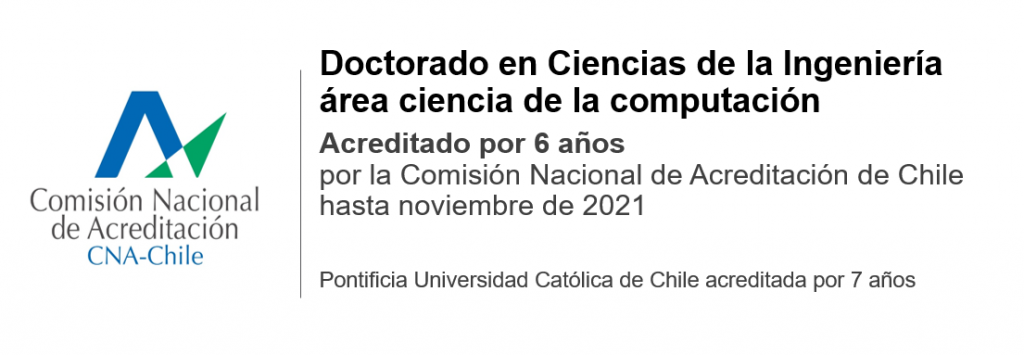
The objective of the Doctorate program in Engineering Sciences, Mechanical Engineering area, is to train researchers with a solid scientific-technological orientation, capable of carrying out research in an original and independent way on the frontier of knowledge, in order to contribute to the scientific-technological development of the country through the generation of knowledge and creation, development and realization of devices, systems and processes in areas such as energy conversion and storage, bioengineering, micro and nanotechnology, design and manufacturing, and control and instrumentation, necessary for society to develop environmentally, socially and economically in a sustainable way.
During the research, new contributions to knowledge must be made in one of the two lines of research (Energy and Thermal Systems, and Design, Materials and Manufacturing), framed in the Mechanical Engineering area of the program, training the doctoral student for their subsequent performance as a researcher with creativity, leadership and originality.
In this way, the graduates of the program will be able to function in any environment in which they wish to insert themselves, either as academics in a higher education institution, as researchers to carry out technological development in companies, development centers and technology centers. and / or as consultants in engineering and innovation and entrepreneurship companies.
Area head: Diego Javier Celentano
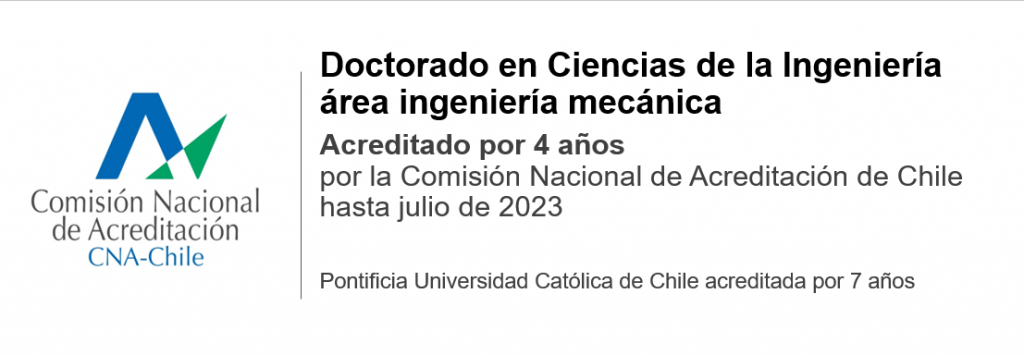
Graduates from the Doctor of Engineering Sciences Program in this area will be world-class specialists who have solid scientific-technological knowledge and who are able to independently conduct original, cutting-edge research, thereby contributing techno-scientific advancements in complex systems in engineering, transportation, management, and logistics.
Area head: Sebastián Raveau Feliú
